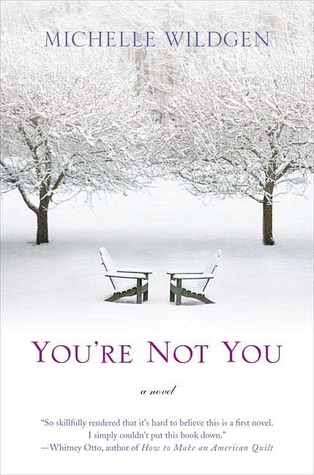Michelle Wildgen’s You’re Not You is a deeply sensual book, a Natural History of the Senses for foodies. “The kitchen smelled so rich—” says Bec, the novel’s central character, “all wine and meat and thyme and onion—it seemed we should be able to taste the air.” A chef’s knife is “a thing of beauty… its sleekness, its weighted, steady handle, its diamond point.” Empty plates “[gleam] with oil and… [bear] hardened, white smears of goat cheese.” Even anxiety is fruitlike: “I felt a plum-sized knot of misgiving.” There is much in this world to savor, Wildgen suggests. I’m not a foodie, but by the end of You’re Not You, I considered buying a steely knife of my own.
Bec, a college student, has an excellent teacher in the kitchen. Kate “used to love to cook” but now has ALS (Lou Gehrig’s disease), uses a wheelchair at thirty-six years old, and requires twenty-four-hour care. Bec is her caregiver. When not working, Bec is sleeping with a married professor and skipping most of her classes at U. Madison. She’s a bumbler, a little tactless. She wanders into things without fully considering the consequences. “What were you?” she asks bluntly at one point, meaning Kate, meaning pre-ALS. But it’s an honest question, and Bec’s lack of self-censorship suits Kate. Worse would be condescension.
Wildgen efficiently delineates the care giving logistics—what Kate can and can’t do for herself and how others do things for her (showers, grooming, meals). Kate is “lined with plastic,” meaning she has a feeding valve with a plug, “the kind that holds air inside water wings.” Because Kate’s speech is labored, Bec learns to interpret for her, and the translation is well-executed by Wildgen—apt subtitles seem unobtrusive ten minutes in.
We’re then free to focus on the juicier details. Kate has distinct preferences—in decorating, in music, in books, in marriage. She reads Alice Munro and smokes pot. She kicks out her husband and uses a vibrator. (“Was there a website or catalog out there that specialized in sexual fulfillment for the disabled?” Bec wonders. “[T]here should be.”) We begin to see Kate as Bec does: complicated, attractive, refined.“I felt an absurd pride in Kate, her beauty and the flash of her grin and this pretty house.” Bec willingly adopts “the aesthetics of Kate”—the wine and spices her boss can’t consume. They go to the farmer’s market together, season after season, and Bec begins to feel she’s good at choosing ingredients and making things taste rich. “You know what it is about French women?” Kate observes.“The stereotype, anyway. Competence. At everything. You’d think it’d be more mysterious than that.” Bec becomes quite “French,” quite proficient. Good cooks can be annoying for this reason, but we’re ultimately pleased by Bec’s know-how. She’s willing not to drift through life, but to shape it. In exchange, Kate acquires an advocate, someone willing to listen to her specific and difficult wishes. “You’re not you,” Kate reminds Bec, at least not while she’s on the clock, not while translating Kate’s weakening voice.
“Dignity is sometimes more important than food,” a wise man, my father, once said. He was a liberal politician who loved caramelized fruits and cobbled crusts. Dignity can be more fortifying, he meant, and just as essential. In You’re Not You, dignity coexists with wonderful food, and I thought of my father on every page. Kate’s lucky—she’s rich, and so she’s able to lead exactly the kind of life she wants. And Bec is luckier—she learns how to make a wicked pear crisp. She gets to eat it, too.





